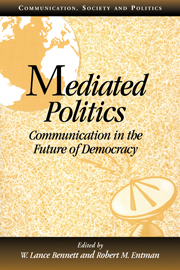Book contents
- Frontmatter
- Contents
- List of Figures
- List of Tables
- Contributors
- Preface
- Acknowledgments
- 1 Mediated Politics: An Introduction
- Part 1 Democracy and the Public Sphere
- Part 2 Citizens, Consumers, and Media in Transition
- 5 Reporting and the Push for Market-Oriented Journalism: Media Organizations as Businesses
- 6 Political Discourse and the Politics of Need: Discourses on the Good Life in Cyberspace
- 7 Dividing Practices: Segmentation and Targeting in the Emerging Public Sphere
- 8 Let Us Infotain You: Politics in the New Media Environment
- 9 The Future of the Institutional Media
- Part 3 Mediated Political Information and Public Opinion
- Part 4 Mediated Campaigns
- Part 5 Citizens: Present and Future
- Index
8 - Let Us Infotain You: Politics in the New Media Environment
Published online by Cambridge University Press: 05 June 2012
- Frontmatter
- Contents
- List of Figures
- List of Tables
- Contributors
- Preface
- Acknowledgments
- 1 Mediated Politics: An Introduction
- Part 1 Democracy and the Public Sphere
- Part 2 Citizens, Consumers, and Media in Transition
- 5 Reporting and the Push for Market-Oriented Journalism: Media Organizations as Businesses
- 6 Political Discourse and the Politics of Need: Discourses on the Good Life in Cyberspace
- 7 Dividing Practices: Segmentation and Targeting in the Emerging Public Sphere
- 8 Let Us Infotain You: Politics in the New Media Environment
- 9 The Future of the Institutional Media
- Part 3 Mediated Political Information and Public Opinion
- Part 4 Mediated Campaigns
- Part 5 Citizens: Present and Future
- Index
Summary
Political beliefs and actions spring from assumptions, biases, and news reports. In this critical sense politics is a drama taking place in an assumed and reported world that evokes threats and hopes, a world people do not directly observe or touch…. The models, scenarios, narratives, and images into which audiences for political news translate that news are social capital, not individual inventions. They come from works of art in all genres: novels, paintings, stories, films, dramas, television sitcoms, striking rumors, even memorable jokes. For each type of news report there is likely to be a small set of striking images that are influential with large numbers of people, both spectators of the political scene and policymakers themselves.
Murray Edelman, From Art to Politics (p. 1)We are living in an era where the wall between news and entertainment has been eaten away like the cartilage of David Crosby's septum.
Al Franken, Chief Political Correspondent, Comedy CentralPolitical communications scholars, members of the press, and political elites have traditionally distinguished between entertainment and nonentertainment media. It is in public affairs media in general and news media in particular that politics is assumed to reside, and it is to this part of the media that the public is assumed to turn when engag- ing the political world. Politics, in this view, is a distinct and selfcontained part of public life, and citizen is one role among many played by individuals. As a former network television executive put it, in the civic education of the American public, entertainment programming is recess.
- Type
- Chapter
- Information
- Mediated PoliticsCommunication in the Future of Democracy, pp. 160 - 181Publisher: Cambridge University PressPrint publication year: 2000
- 21
- Cited by

